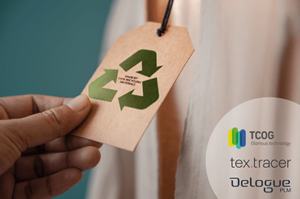Sustainability legislation: how to prepare?
From the Extended Producer Responsibility (EPR) to greenwashing guidelines – a wave of sustainability obligations is coming for the Fashion and Retail sector. This results in strategic puzzling, but you can prepare yourself. Advanced software helps you comply with laws and regulations, while improving your business results.
FashionUnited asked software partners TCOG, Delogue and tex.tracer for an overview. Which laws and regulations are getting closer? How should you prepare? And how can technology help you be compliant?
Sustainable legislation: CSDD, CSRD, green claims, and product passports
Many European laws on sustainable production are still in their infancy, but when it comes to transparency, it’s all hands on deck. In the coming years, the CSDD (Corporate Sustainability Due Diligence) and CSRD (Corporate Sustainability Reporting Directive) will demand the attention of every Fashion and Retail company. In short, the CSDD imposes mandatory due diligence measures on companies regarding human rights and the environment. The CSRD is the instrument with which they’ll have to report on that process. It provides both consumers and businesses with honest insights into the sustainable progress that has been made.
Companies will have to dive deep into their supply chain to collect the required product data and communicate openly and transparently about it. For the time being, the obligation only applies to large companies. “There is considerable uncertainty regarding the impact on smaller companies,” says Anja Padget. As an Expert in the field of Environmental, Social & Governance (ESG) at PLM partner Delogue, she advises her clients to start preparations as soon as possible. Traceability platform tex.tracer adopts a similar approach. Founder Jolanda Kooi: “Smaller companies often work with customers who do have to be compliant by 2024 or 2025, such as Zalando, de Bijenkorf and large retailers. The latter will put pressure on their small suppliers to provide the required data. In such cases, insight in the supply chain is necessary to make your small or medium-sized company future-proof.” Eric van der Craats from Microsoft ERP Partner TCOG adds: “To govern is to look ahead. Whether you are a small, medium-sized, or large organization: laws and regulations are coming, and you want to avoid being left behind. Besides, who wouldn’t strive for excellent corporate citizenship?”
Rules on greenwashing are also in the works, to prevent misleading green claims from spreading through the European Union. It’s an important topic during tex.tracer’s conversations with customers, says Kooi. “Instead of communicating assumptions about your product’s footprint, you can collect the precise information so that both companies and consumers base their choices on facts.” Reliable product data is also needed for the creation of “product passports” that are already being launched in the form of QR codes and online data about the product journey – long before the official legislation demands it. Companies are cautious about disclosing their footprint, but according to Kooi, doing so always works out beneficially. “By sharing your progress, you can make clear that you are on a serious sustainable journey in line with your green claims.” Van der Craats: “I fully agree with that. It allows you to distinguish yourself in the market. The technology to facilitate transparency is there. It is really a matter of wanting it, then doing it.”
Don’t settle for putting out fires
As long as sustainable legislation is not mandatory, many companies are taking a wait-and-see attitude. That’s risky, says Padget, since it creates a stressful work environment. “I know it from my experience as a buyer: suddenly you’re facing all problems at the same time, and you have to work sixty hours a week.” Big steps will need to be taken. Many companies, large and small, are still working with separate Excel sheets for different fashion styles. But the new way of ethical reporting requires aggregated data, for example to calculate the CO2 emissions of an order. “Instead of having to combine 1,200 sheets,” Padget begins, “wouldn’t it be more convenient if you could extract the impact information from your IT system containing your product lists, integrate it with the PO ordering system and create your reports based on that?” “That is a wonderful example!” says Van der Craats.
Platforms like Delogue, tex.tracer, and TCOG are ambitiously addressing the question of how to centrally manage impact data. Through the Delogue platform, designers, buyers, suppliers, and engineers can insert the impact data needed for the new way of reporting. After PLM, the purchase orders are sent to Microsoft’s ERP (Business Central) for sampling. The system takes care of the order and then manages the entire process of purchasing, logistics, sales, and the financial settlement. TEX.tracer can guarantee through timestamps and geolocations that all steps in the process are traceable and verifiable, so that claims can be substantiated with facts. Since the tex.tracer platform is built on the blockchain, the data is immutable. With such an ecosystem of cutting-edge software solutions, you position your business at the forefront of the sustainable movement.
Get started today: map, define, mitigate
According to Kooi, due diligence is not an end goal, but a process that is in your own hands. Drawing up your due diligence policy is the very first step towards a transparent production chain and more sustainable offer. Plus, it helps you comply with new legislations. It starts with mapping your production chain to identify all negative impact categories. Then you determine the hotspots: which footprint should be improved first. You set your goals and plan targeted actions in line with those goals. Only then, advanced data collection and verification begins. You repeat that process until you are where you want to be.
In recent years, greenwashing cases against major retailers such as Primark and H&M Group have shown how badly it can end if green claims are not substantiated with verified data. With the right tech stack, you mitigate the risks. Padget: “Let’s stop asking the question “do we have to meet this new rule” and think more about the future we want to see. What tools can we offer companies so that they can create a stronger fashion ecosystem?” Van der Craats: “Companies should integrate sustainability – and therefore data – into the core of their business processes. As an ERP supplier, we aim to make a significant contribution. Our goal is not only to assist in improving operational efficiency but also to lay the foundation for our clients’ journey towards a transparent and green future.”
Webinar: Prepare for the wave of sustainability obligations
On April 18, TCOG, Delogue and tex.tracer are hosting a webinar on the next steps fashion companies need to take to become more sustainable. You can sign up for the webinar here.







